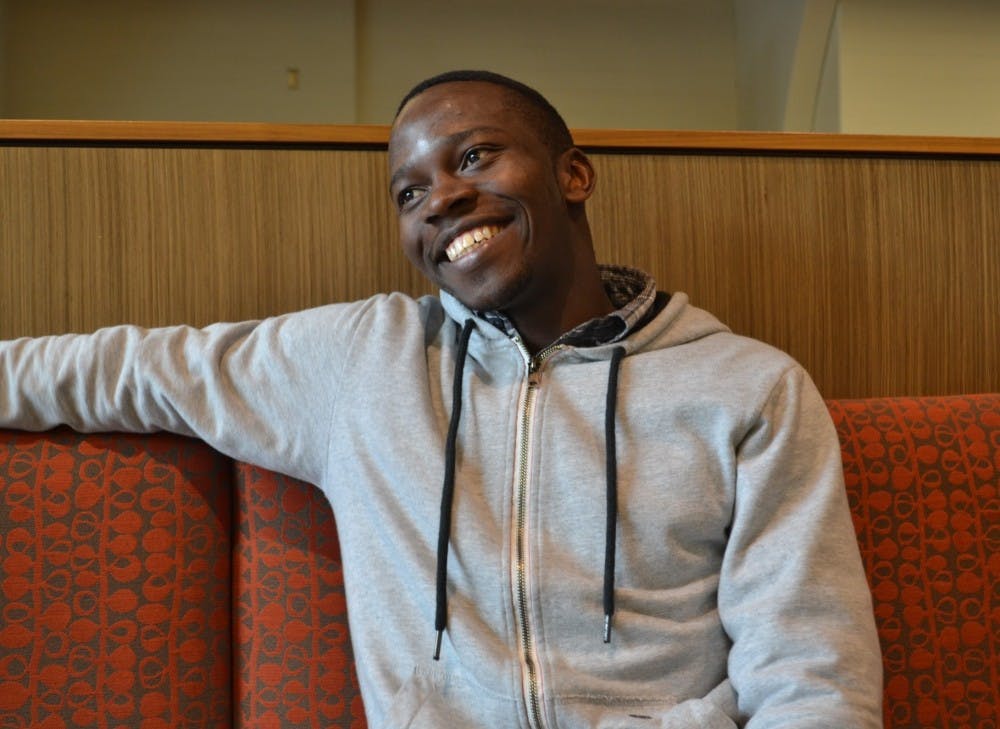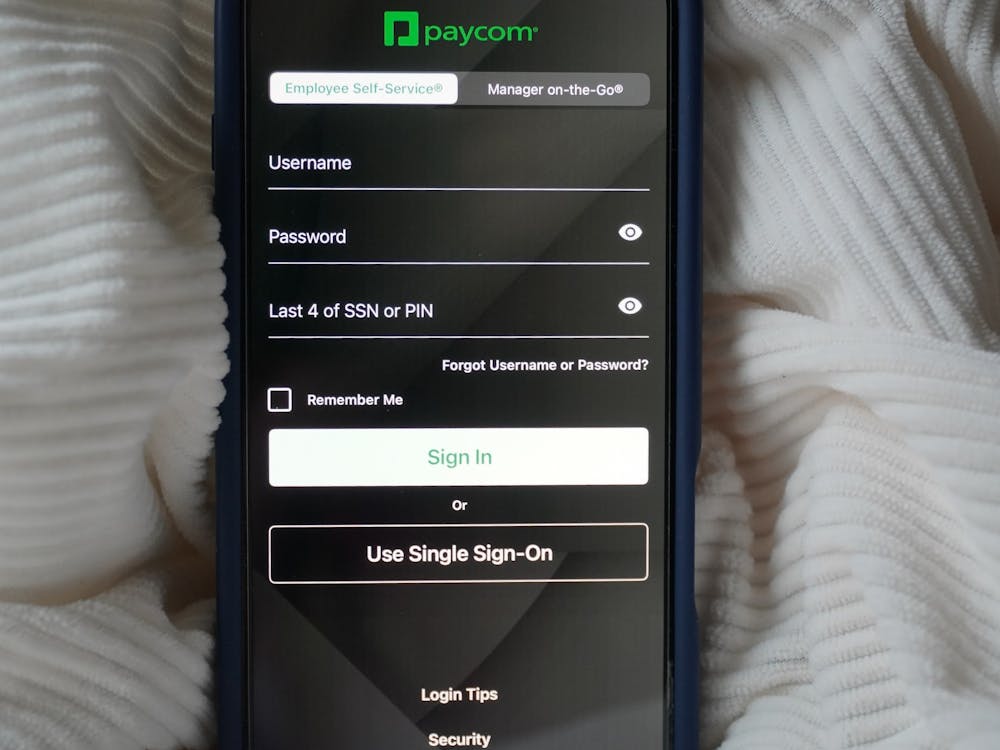Kate Stringer |
For people in the United States, it’s not surprising to hear that junior John Julius Muwulya had the opportunity to attend school as a child. But for the citizens in the small southern Ugandan village where Muwulya lived the first 15 years of his life, his access to an education isn’t something that’s assumed. Instead, Muwulya grew up watching kids whom he describes as smarter than himself miss out on education because they couldn’t afford tuition and fees.
That’s when he realized he wanted to be a leader that can make a change in communities.
“My goal in life is to make a difference and change the world someday and give back to the community that has given me so much, so that my kids and grandkids, when they’re born, are going to find a world maybe better than I have found,” Muwulya said. “That’s my philosophy about life.”
This belief that he could change the world also inspired his decision to run for ASUP president with junior Josh Cleary against incumbent president Quin Chadwick and vice president Elvia Gaona, also both juniors. Muwulya and Cleary won the election with 68.4 percent of the vote, using their two-ply and WiFi campaign, which places toilet paper and improved WiFi as the new presidential team’s top priorities.
“I think being able to talk with as many (students) as I’ve talked to and hear their stories and what they want to do with their lives, what paths they want to take, how they want to change the world, every single aspect of what they want to do, is outstanding,” Muwulya said.
Growing up in a Ugandan village
Muwulya grew up in Uganda with his mother, now deceased, and sister Noela Nalujjuna, a 2008 UP grad.
Nalujjuna describes the village she and her brother lived in as a place where everyone knew everyone, where village elders could discipline a child misbehaving in public, where Muwulya developed a love of soccer (preferred position midfielder, because that’s how you score all the goals), where dinner table topics were Ugandan and community politics.
But the part of Uganda that had the biggest impact on him was his mother.
A single mom, she worked from 5 a.m. to 10 p.m. as a nurse, sometimes waking up in the middle of the night to assist a woman giving birth, tend to the victims of an accident or assist people suffering injuries from a fight.
“She basically sacrificed her life for me,” Muwulya said. “She gave me every single resource I needed for me to be very successful.”
His mother’s selfless influence has infused Muwulya with the desire to give back. He hopes to someday be chairman of the United Nations, whose programs he believes he can help improve, especially the disparities in education.
“I want to give back to the community so those people can be successful,” Muwulya said. “Maybe it’s going to be Uganda, maybe it’s going to be Haiti, maybe it’s going to be any country around the world.”
His 15 years in Uganda were interspersed with month-long visits to his father, who is a U.S. citizen. While Muwulya said both his mom and dad encouraged him to live in the United States since he was young, he wanted to stay in Uganda to learn more about that culture.
When he decided he wanted to attend high school in the U.S. to better prepare for college, Muwulya moved to Portland, where he went to Grant High School, played varsity soccer and served as senior class president.
Muwulya was accepted to every school he applied to, including Stanford. But with the most financial aid from UP and encouragement from his sister, he became the second Pilot in his family, a choice he describes as his “best decision.”
“His heart is in the right place,” his sister Nalujjuna said. “I do believe he will handle responsibilities with grace. I am very excited to see him follow his dreams and not give up.”
It’s all about communication
Next school year, Muwulya hopes to make ASUP more accessible to the students by having both senator and executive board office hours take place in visible public places like the Commons as well as have comment boxes in the Library for students to voice concerns.
Even though Cleary notes Muwulya’s friendliness towards the UP community, he said this won’t stop him from bringing student concerns to the administration.
“What I’ve seen in senate is he can disagree with someone without being disagreeable, and I think that’s key,” Cleary said. “He’s excited to stand up for the students and his friends really, at the end of the day.”
Muwulya agrees, adding he hopes to find middle ground between administration and students.
“I’m not trying to be friends with the administration,” he said. “Our goal is to work with them.”
Two-ply WiFi secrets revealed
The two-ply WiFi campaign grew out of a conversation Cleary had with the residents of Villa Maria Hall, who, inspired by Sociology 101, instructed them that their campaign needed to be based on two practical ideas. The idea to campaign on Internet and toilet paper transformed into two-ply and WiFi when other students heard about it and realized the rhyming connection.
Muwulya and Cleary didn’t pass any resolutions to fix these problems on senate because they felt it was an executive rather than senatorial decision, according to Muwulya. At a meeting with IT during the campaign, Muwulya said they learned the bandwidth should be increased by May. If problems still persist, they hope to use Major Project Fund money to address the WiFi as well as pay for better toilet paper.
Senator and sophomore Temo Ledua said that even though the two-ply and WiFi campaign was humorous, it also showed that Muwulya and Cleary listened to what students felt were some of the biggest complaints on campus.
“When we talk, (Muwulya’s) the kind of person that actually listens and you can tell he’s very attentive,” Ledua said.
The concerns come out
Despite winning the presidential election with a landslide margin, some students say Muwulya’s time as a senator was unremarkable. Former ASUP senator and junior Sarah Weedin addressed concerns about Muwulya’s lack of verbal contribution to senate.
“He didn’t really use his voice and he didn’t try and make a difference, and make an impact in senate,” Weedin said. “For someone who wanted to be the president, I feel like you should have been more vocal and been more willing to create change.”
Student Activities Director Jeromy Koffler also observed Muwulya’s lack of vocality in senate, but doesn’t think it is necessarily problematic for his term as president.
Weedin, who has served as senator for two and a half years, was chair of the ASUP awareness committee, which Muwulya was also on. Weedin forgot Muwulya was on the committee as he didn’t show up to most of the meetings or complete assigned tasks, a problem Weedin said most of the members of the committee also had.
Muwulya acknowledged his absence from these meetings, saying he “got caught up.
Weedin has higher expectations for Muwulya’s presidency.
“I really expect them to handle it and to step up and get it done because there’s no reason why they shouldn’t if they believe they are better qualified candidates than the current ones,” Weedin said. “They need to prove to me that they are.”
Cleary, however, believes he and Muwulya can do a better job at communicating with the students than the current ASUP executive board. Especially in cases like the themed housing change, Cleary believed that ASUP could have tried harder to maintain the International House.
“The administration was making decisions and saying, ‘give us student feedback,’ but ASUP was dropping the ball on that. If we address the communication, It’s going to help a lot.” Cleary said. “We realized we need to fix this from the top down.”
Muwulya believes the biggest cultural difference between the U.S. and Uganda is the U.S. focus on the individual rather than community. He hopes he can bring his Ugandan experience of community to the UP campus as president.
“Every single student, no matter who they are, no matter what sexual orientation, I want to make sure that yeah, this is their place,” Muwulya said. “They can work really hard, they don’t have to be scared or afraid about anything. They can be safe.”








